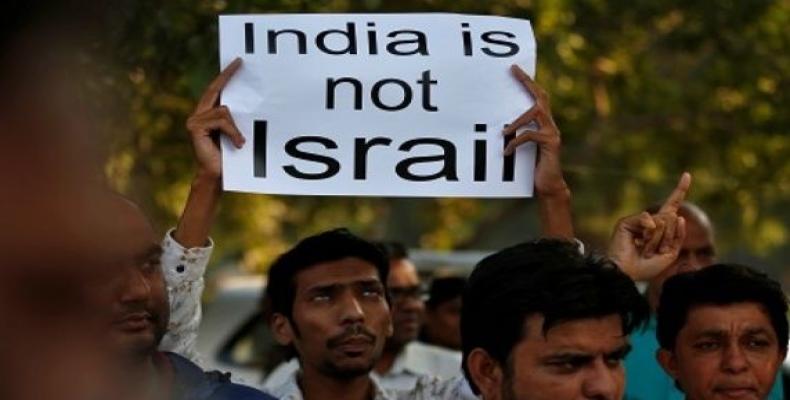New Delhi, December 11 (RHC)-- Hundreds of protesters demonstrated in India after right-wing Prime Minister Narendra Modi’s government passed a contentious bill in the Lower House of Parliament, which will allow a pathway to citizenship to religious minorities from three neighboring countries, except Muslims.
The bill was approved 311-80 by a lower house dominated by Modi’s ruling Hindu nationalist Bharatiya Janata Party (BJP). Dubbed the Citizenship Amendment Bill (CAB), the proposed law seeks to change the country’s 1955 citizenship law and to create a legal pathway in order to grant the Indian nationality to "persecuted" minorities - Hindus, Sikhs, Buddhists, Jains, Parsis, and Christians - from Bangladesh, Afghanistan, and Pakistan; excluding Muslims from the recipients.
The CAB was originally introduced in 2016 during Modi's first term but it was not enacted in the upper house after mass protests in the northeastern part of the country rejected it. Last week, Interior Minister Amit Shah introduced the bill again in India’s lower house amid harsh criticism as opposition parties firmly stood against it. Shah claimed that the law is necessary as it would offer asylum and protection to people fleeing religious persecution.
“In these three countries, Hindus, Buddhists, Sikhs, Jains, Parsis and Christians, followers of these six religions have been tormented,” he said before the bill was tabled after a vote.
Yet, opposition politicians along with demonstrators say the bill is “anti-Muslim” and violates the secular principles of the constitution, which prohibits religious discrimination against its citizens and guarantees all people equality before the law and equal protection of the law.
“The bill explicitly and blatantly seeks to enshrine religious discrimination into law, contrary to our long-standing, secular constitutional ethos," Delhi-based lawyer Gautam Bhatia said.
Historian Mukul Kesavan said the bill is "couched in the language of refuge and seemingly directed at foreigners, but its main purpose is the delegitimization of Muslims citizenship."
Critics point out that if its real purpose is to protect minorities, the bill would have included Muslim religious minorities who have faced persecution in their countries, citing, for instance, Ahmadis in Pakistan and Rohingyas in Myanmar. Instead, India's far-right government has gone to the Supreme Court seeking the deportation of Rohingya refugees from India.
As protesters returned Monday to the streets in the northeastern city of Assal to oppose the bill, student groups also called for a dawn-to-dusk shutdown in four districts of the state. Shops, businesses, educational and financial institutions remained closed down and public transport was unavailable.


